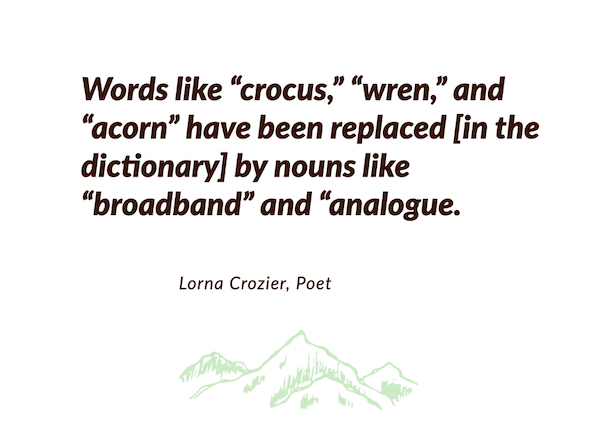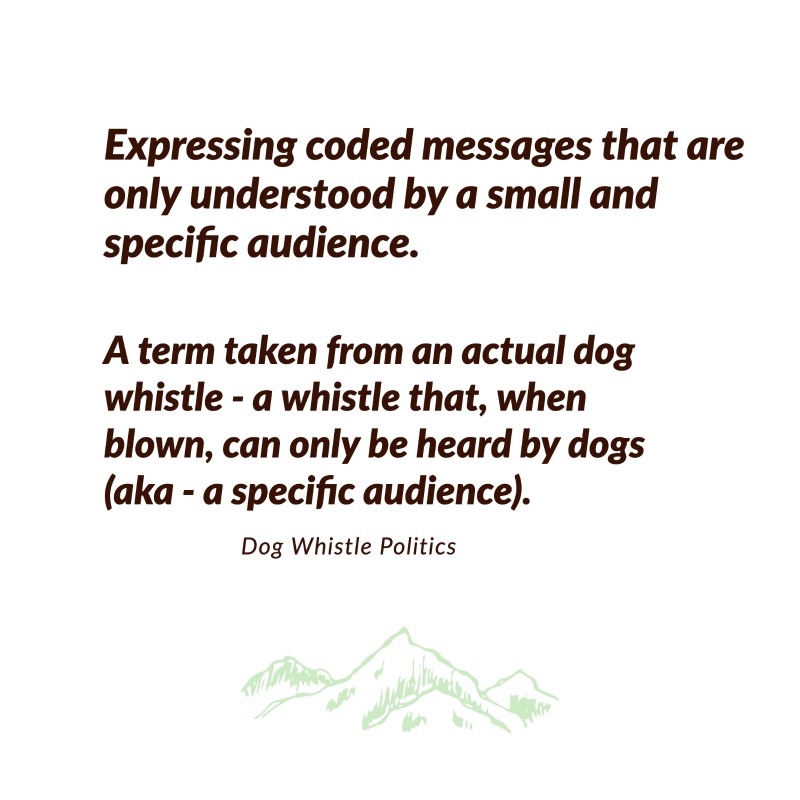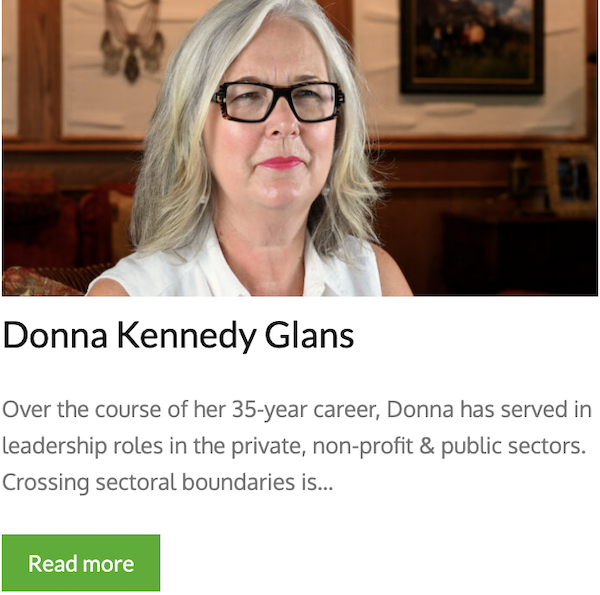Be Better
Chapter Eight
Tar sands. Foreign-funded radical.
Great branding. Like, really, really good.
You get what’s trying to be conveyed and it stirs emotion.
But they’re also words that convey bias and sow the seeds of division. And that’s a problem – especially if the goal is to report the news or build cross-partisan support for an idea.
 Lorna Crozier understands this better than most.
Lorna Crozier understands this better than most.
“We only have to look at the deterioration of rhetoric in the political sphere to reaffirm that language matters.”
Lorna’s one of Canada’s most celebrated poets, having authored 20 books, served as writer-in-residence at numerous universities and been honoured with Canada’s top literary awards, including being named an Officer of the Order of Canada.
“When every word, every syllable counts, the poet treats words as if they are living things to be respected, well-cared for, allowed to sit in the sun with something delicious to feed them.”
That reverence for words is a value Lorna believes should extend beyond poets to all of society. After all, she says, we’re losing words that matter.
 “A sad barometer of our loss of language is the list of words that have disappeared from common use, so much so that the Junior Oxford Dictionary left them out of its recent editions. Words like ‘crocus,’ ‘wren,’ and ‘acorn’ have been replaced by nouns like ‘broadband’ and ‘analogue.’ Dozens of things from the natural world have been dropped in favour of technological terms. It’s an alarming sign of our species’ growing separation from plants and animals”
“A sad barometer of our loss of language is the list of words that have disappeared from common use, so much so that the Junior Oxford Dictionary left them out of its recent editions. Words like ‘crocus,’ ‘wren,’ and ‘acorn’ have been replaced by nouns like ‘broadband’ and ‘analogue.’ Dozens of things from the natural world have been dropped in favour of technological terms. It’s an alarming sign of our species’ growing separation from plants and animals”
It’s also alarming because in today’s world, we need more words, not fewer. As Lorna says, “the more complex the issues the more the demands that are placed on language.”
And our issues are complex. It’s for that reason Lorna argues: “When we fail to name things in a way that allows us to be understood by others the purpose of writing and speaking blows into garbled bits.
“Words of substance show a clarity of thought, which might lead to a clarity of action,” Lorna argues. “The misuse of language is disrespectful and destructive. Socrates says it is harmful even to the soul.”
Right now, we’re oversimplifying complex subjects to fit 280- character counts, defaulting to all-encompassing phrases like tar sands and foreign-funded radicals because they fit the medium and double as good branding.
But they’re not thoughtful words; they’re not elevating our discourse.
Take, for example, the term tar sands – a common phrase used to describe Alberta’s oil sands by many environmental activists and even some journalists.
If you know nothing about the oil sands in northern Canada, this slogan might help you quickly understand the position of activists who feel industry is dirty and harming the environment.
But for those who work in Alberta’s energy industry – in the oil sands themselves – the term tar sands is not just controversial, it’s disrespectful.
Though tar sands is a term that originated in the energy sector, it’s no longer an accurate description of the oil sands. And when people use it?
Well, to some, it’s seen as a loaded phrase that negatively brands the industry, while staking out an anti-development, anti-resource worker position.
 Some refer to this as dog-whistle politics – using seemingly innocuous words or phrases to slowly and subtly turn large segments of the population against a certain idea or, in extreme cases, against specific types of people.
Some refer to this as dog-whistle politics – using seemingly innocuous words or phrases to slowly and subtly turn large segments of the population against a certain idea or, in extreme cases, against specific types of people.
And whether or not you believe environmental activists are engaging in dog-whistle politics by rebranding the oil sands as the tar sands, there is no denying that the term is, at a minimum, highly politicized.
Not unlike the phrase ‘foreign-funded radical’, argues political science professor Dr. Will Greaves.
“I think we can trace some of the recent roots of our divisive discourse in Canada to the way in which the then-Harper government used what, to me, I perceived as frankly offensive language. (Foreign-funded radical) was used to really demean and segregate out of the mainstream of Canadian public opinion people who were publicly expressing their concern about environmental protection.”
The phrase ‘foreign-funded radical’ was – is – used to describe environmental activists who receive funding from sources outside of Canada.
And if you don’t understand the nuances of the environmental-economic debate, ‘foreign-funded radical’ does quickly convey and brand environmentalists as having extreme views, possibly supported by those with a nefarious agenda – like Americans, so the story goes, who seek to harm Canada’s prosperity in order to improve their own economic standing.
Like tar sands, ‘foreign-funded radical’ is seen as a justified moniker in some quarters, but anti-democratic in others.
 Why? Dr. Will Greaves explains.
Why? Dr. Will Greaves explains.
“Language like foreign-funded radicals, language like eco-terrorists: People were painted as unpatriotic, they were painted as anti-Canadian, in a way that offended people, but also more or less eliminated the room for common ground.”
When we adopt language like tar sands and foreign-funded radical – often innocently, without thinking – we perpetuate stereotypes, harden divisions and polarize conversations, making solutions that much harder to find.
“The negotiating range between, call it the left and the right, in this country around energy, environmental and economic issues is narrower than it was because of a kind of zero sum, winner-take-all approach to politics.”
Why is that concerning? Will explains.
“The only way that change can be advanced is collaboratively and is in a way that is based on consensus building and mutual respect and the efforts to find common ground as much as possible on these questions.”
 But divisive language and polarization has even bigger consequences for our society, argues Donna Kennedy-Glans.
But divisive language and polarization has even bigger consequences for our society, argues Donna Kennedy-Glans.
“If we lose the ability to talk to one another about issues that really matter, we’ve lost everything. We’ve lost our culture; people are losing relationships. How many people have been unfriended by friends on social media? It happens to me all the time.”
Donna is an author and lawyer, as well as a former energy executive and former conservative cabinet minister in Alberta. And she’s a passionate advocate for Canada to move beyond polarity.
“Beyond polarity is saying, ‘okay, there’s polarization happening’; people are picking an either/or team. But there are ways to find a third path. There are ways to rise above that without picking a team or, if you pick a team, then choose to go beyond that polarity or that black and white.”
To move beyond polarity though, we first need to understand what’s triggering polarization, Donna believes.
“I think we need to learn when our buttons are being pushed, just like in marketing and advertising. People are really able to manipulate us based on what’s going on right now and I want people to be able to say: ‘Whoa, whoa, whoa! That’s manipulation! Not on. I’m going to do something differently.’”

Donna adds, right now, for advocates on all sides of an issue, it pays to polarize.
“If you’re marketing – because that’s what you’re doing as an advocate, you’re marketing a point of view – it’s sometimes to your advantage to say things that are alarming.”
Why? In in our noisy media landscape, quick, clearly branded phrases like foreign-funded radical or tar sands cut through and sticks.
And though we might not like it, negative, polarizing marketing works: It’s often effective in rallying enough of the population – usually in key electoral ridings – to buy into an idea, creating quick, cost-effective wins.
But there’s a consequence, Donna explains. When we use loaded words to quickly debate an issue, “it’s everybody in their corner, it’s everybody claiming their right.
“It’s easy to say, well, their motive is they want money or they want power. We stop thinking about what they’re saying and just jump to: ‘Well of course they’re gonna say something stupid that I don’t agree with’. And in this scenario, you never have any listening going on.”
That’s the problem: We’re not listening because of the language we use. But polarized language isn’t the only culprit, Donna adds.
“I think there are people out there who use ‘either/or’ language. ‘Either you’re with me or you’re against me.’ But there are also people out there who are say: ‘We can all get along; I all of our environment’. That doesn’t get us anywhere either. And I know it sounds really nice, but we’ve got to deepen that conversation.”
For Donna, deepening the conversation begins with really hearing the full spectrum of opinions that exist in Canada.
“The poles still matter. We get to better answers when we include ideas from the full continuum (of the political spectrum).”

She’s right. Unless everyone feels heard, our solutions will be imperfect. But it’s hard to be heard if we don’t feel heard. And we won’t feel heard so long as our words harden tired stereotypes; until others stop using oversimplified words to place us into ill-fitting boxes, as Donna explains.
“I am small ‘c’ conservative. I was raised in a traditional setting, so I have these values. But I also have lots of other values that aren’t conservative. So, let me decide about me.”
Donna continues, “but when they see me say something that they perceive to be conservative, and they’re liberal, they get angry at me. I need to know how to engage with those people in a way that isn’t just placating them or going, ‘oh, you know, I agree with you’, because I don’t agree with them on everything. And I have the right to be passionate about what I’m passionate about.”

Indeed, we all are. We’re entitled to have our perspectives, within reason. And maybe we were once allowed to have and air our views through mainstream media, but media’s changing. And as it changes? We’ve become less accepting of differing opinions; less open to hearing them.
Indeed, good communication, in many ways, isn’t just about choosing our words more thoughtfully. Good communication is really about listening to how different people understand and see themselves within an issue as polarized and complex as the environment. As Donna tells us, that’s how we can find newer ways to balance the needs of people and nature that truly move us beyond polarity.
“The hardest question is the why. Why do you say that? Why do you feel that way? And it’s a question in our culture. We’re not that comfortable with it, but I use ‘why’ a lot when I’m talking to people because it means I’m listening. And it means I want to understand where that perspective or passion comes from. And I’m not judging you. And I think the not judging is really important.”
Donna adds, “I will judge somebody who tries to put me in a box that I don’t want to be in. I’ll push back really hard. I’ll judge somebody who is trying to sell me something without saying so by virtue signaling. Don’t tell me what my values must be. As long as I’m not illegal, I can have whatever values I have. They are what they are.”
But Donna summarizes: “The non-judging – holding the space and not judging another – but trying to understand, when it matters, what’s motivating them starts with: Why?
“The why question is probably my anchor. That’s the best tool I’ve got in my kit.”